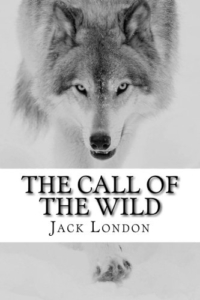 Darwinism and Danger: The Edgy Classic That Just Didn’t Capture Me
Darwinism and Danger: The Edgy Classic That Just Didn’t Capture Me
Author: Jack London
Buck, a majestic dog with a cushy life, is kidnapped by his rich master’s desperate gardener and sold as a sled dog to participate in the brutal Klondike Gold Rush. Transitioning from pampered beast to something more primordial, Call of the Wild follows Buck’s short adventure examining survival of the fittest in a literal dog-eat-dog world. Long a favorite, the tale brings adventure and strife alive, pitting readers against harrowing sledding journeys in sub-zero temperatures, contemplating the greed of man and the passionate desire for blood inherent in his beasts. The conclusion is the making of a legend, the swift, brutal journey completed on its wildest note.
Shedding the veneer of civilization, Buck quickly responds to the “call of the wild,” frequently having visions of cavemen and his wolf ancestors. Under the law of “club and fang” Buck passes from brutal, greedy masters, engages in exhausting journeys and physical deprivation, and watches the good dogs die as the dominant wolf-blood of his not so long lost ancestors calls for supremacy.
We don’t see much of Buck before his Alaskan adventure begins and what we do see is a physically well cared for dog that is more or less emotionally neglected by affluent, absentee owners. Buck isn’t your Lassie type and his extraordinary reaction to strangers, which turns out to be a fortitudinous interpretation of the bad crowd he’s been passed along to, hints at a dog with some behavioral problems. From the start of his transfer to Alaska, Buck is fairly vicious but no match for the heartless men he encounters who dream of gold and beat Buck into submission.
Even more shocking, perhaps, is the enmity of the other dogs. The typical image of a happy pack, tails wagging, howling at the moonlight and capering in the sun is not one for this book. The dogs are opportunists and jealous, desirous of being leaders at any costs. It’s an almost human like quality – this ability to ignore all in the effort to gain power, and the irony here is that it is undiluted nature in its purest, most aggressive form.
With all the guts and glory, the dangers and betrayals, and a wild protagonist parading as man’s best friend, it seems as though Call of the Wild has everything it needs to captivate and devastate an audience. Yet during this, my second reading of the book, something is still just missing. Technically a novella (or lets face it, just a really long short story), Call of the Wild covers a lot of ground (both geographically and plot wise) in a rapid conglomeration of Spartan pages. In this mode, we are mere observers of the drama and not participants. It’s discussed what Buck losses, or more aptly, what he throws aside as worthless, yet we had no time to get acquainted with him before and cannot really see how dramatic the change is.
Long a fan of any animal related story, I’ve plowed through The Incredible Journey multiple times and also human + animal stories in the form of such classic favorites as Julie of the Wolves, Lassie, The Jungle Book, All Creatures Great and Small, and more. When I first saw Call of the Wild in high school, the elegant picture of a wolf like dog against a snowy world in the cover was all I needed to see. Imagine my consternation then when I found that I just couldn’t connect with Buck, who is essentially Spock in dog form. The cold survival logic comes so quickly, and seemingly with so little upheaval, that the protagonist is too far from our sympathies or our conceptions of man’s (and woman’s) favorite animal companion. Buck’s natural instinct is so easily accessible to him despite generations of captivity that the big theme of Darwinian survival is more predictable than tense. Upon my second reading, maybe a good ten to fifteen years later, I still find myself coming away with the same feeling of detachment from the noble canine lost in the selfishness of adventurous men.
Of course, there is kindness too, even affection and loyalty between Buck and certain humans. Yet this is also simply described and while Buck’s vision of the caveman and his attraction to the artic wolves is evocative, his loyalty is a thing told of, his affection something we know but never really feel. A lot of this is probably due to the fact that the story just happens so quickly. Of course, Incredible Journey was short too and I loved that . . .
By the time Buck’s fight for survival and domination are complete, the novel has briefly covered a lot of explorations and near misses, all of which are thrilling and fun in a preliminary, summarized way. Then . . . then it’s just over. Just as we begin to settle into the extremities of Buck’s life and wonder where his time with man will converge with his growing sense of wildness, just as the death and adventure captivates us in a cold, hard world, the conclusion arrives. Although the ending is satisfying, even a little fairy-tale like feeling as it establishes a legend and a history, the ultimate truth is that readers have been in this world, with this aloof dog, too short a time to adequately remember much of the story after the final chapter or maintain any of its temporary magic.
– Frances Carden
- Book Vs Movie: The Shining - April 6, 2020
- Thankful For Great Cozy Mysteries - December 13, 2019
- Cozy Mysteries for a Perfect Fall - October 20, 2019


